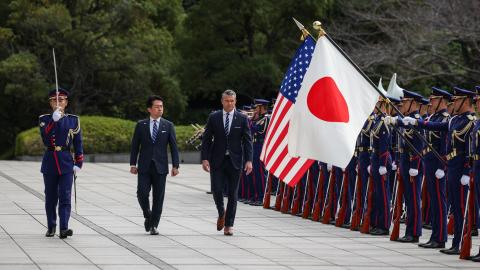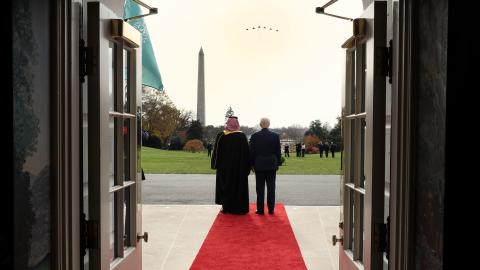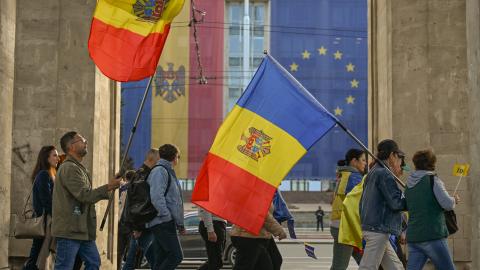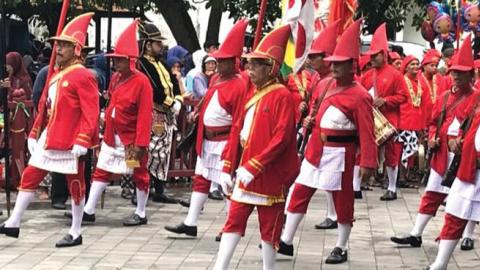YOGYAKARTA, Indonesia-- We were up bright and early to head to the center of Yogyakarta, Indonesia, often known affectionally as Jogja. We were going to a birthday party, and tens of thousands of others were also going, and soon the clogged streets would be closed to traffic. The birthday was of Islam’s Prophet, and in Jogja this is a very big deal.
Within Islam there has been continuing controversy about whether it is legitimate to celebrate Muhammad’s birthday. Most Muslims celebrate it, and there are often special foods and music. However, in Wahhabi Islam, the conservative sect prevalent in Saudi Arabia, it has been treated as bid’ah, innovation, and thus forbidden. In 2015, Saudi Arabia’s Grand Mufti Sheikh Abdul Aziz Al-Asheikh issued a fatwa declaring that such celebration was evil.
There has also been controversy over the matter in the organization Muhammadiyah. Founded in Jogja itself in 1912, it has some 30 million followers, making it Indonesia’s - and the world’s - second-largest Muslim organization. But nowadays, for most of the city’s population, holding a major celebration is a forgone conclusion.
So naturally, I was expecting a lively time, for there had already been seven days of games, markets, singing and traditional gamelan concerts as part of the week-long Sekaten festival. Even so, I was shocked when we drove beside the northern Alun-alun, one of the huge central squares of the city. There was a massive, newly erected fairground, complete with several Ferris wheels, carousels and myriad other rides, as well as booths for games, and hundreds of market stalls selling everything under the sun. But we kept going, along with most of the crowd, and headed for one of the gates of the kraton, the Sultan’s palace, where the day’s events would begin.
A Real Monarchy
Jogja is a center of classical Javanese art, culture and tradition, and has an unusual political structure. Whereas all other Indonesian provinces have elected governors, Jogja is ruled by a hereditary monarch, a Sultan who is also the governor. This monarchy is not merely decoration to add pomp and color to the usual drabness of everyday politics. The sultan has real clout. His titles include “His Highness the Sultan, Commander in the Battlefield, Servant of the Most Gracious, Cleric, and Caliph that Safeguards the Religion.”
When Sukarno proclaimed Indonesian independence from the Dutch on Aug. 17, 1945, then Sultan Hamengkubuwono IX expressed his support for the newly formed country and declared that the Yogyakarta Sultanate was part of the Indonesian Republic. This was a courageous act since the Dutch later captured Jogja, which was the country’s capital from 1946-1948. The Sultan also fought in the independence war. Because of this, at Indonesia’s independence Yogyakarta became a special district and President Soekarno allowed the Sultanate to continue and appointed Hamengkubuwono IX to head it.
The present Sultan Hamengkubuwono X rose to the throne in 1998 and was active in demonstrations calling for long-time dictator Soeharto to resign, and in subsequent attempts at reconciliation. He also abolished polygamy.
There have been attempts to abolish the monarchy. In 2010, Indonesian President Yudhoyono pushed for direct elections for the Yogyakarta governor and vice-governor, thus leaving the monarchy as a ceremonial figurehead. The response was angry protests in Jogja against the plan, which the President then shelved after receiving the concession that the Sultan would sever all ties to political parties.
And so Sri Sultan Hamengkubuwono X, an impressive and energetic man, remains the monarch, the Governor, and the Caliph.
The Celebration
In the Grebeg Maulud, the Sultan gives food that has been blessed to the people. The food is piled into “mountains” called gunungan to be carried in procession on the shoulders of palace retainers from the kraton to the Kauman Great Mosque to be given away. One reason for this is to build solidarity between the palace and the people. In Javanese, this is called manunggaling kawulo gusti - the union of servant and lord. It also has overtones of a mystical teaching referring to union with Allah.
The mountains of food were brought to the mosque, and when permission to take the food was given, we leaped back from the happy scramble as the mountains were set upon by the crowd and quickly torn apart. The scramble to eat is not due to hunger but for the blessing that the food is believed to bring. After that, many returned to the Ferris wheels, markets and many other celebrations throughout the city.
This prospect was exciting enough, but perhaps my biggest shock was that when the palace gates were opened to begin the procession, out marched what looked to me like a band right out of New Orleans, with black uniforms and huge top hats that would have made Lincoln look puny. This Bourbon street look was countered by the fact that apart from drums, they also carried ceremonial spears, swords and keris. These were the Bugis Brigade of the palace guards, one of many traditional military formations.
This first group of traditionally-garbed palace guards was followed by others in red, black and white, and others in red and gold and white, whose long hair and elaborate hats were festooned with flowers, and there were yet others. The Wirabraja Warriors have red conical hats and processed in a majestic slow march. There were also horses and carriages, and I am told that in other parts of the processions through the crowded streets, there were elephants, though alas I saw none.
Does it fit with Islam?
Later that day we met with the senior imam and asked about the religious meaning of the day –particularly since some thought that it was too pagan, and a departure from Islam. He told us that the ceremonies began with a Muslim ruler giving food to his subjects as an expression of his belief. This was something that commended Islam to the people and so should be continued and praised. Later that day, the imam recited the life of Muhammad before the Sultan and his senior courtiers.
Beyond the elephants, mountains of food, top hats, flowers, and Ferris wheels, we were assured by senior Muslim figures that unless there is something evil in the local culture, then it should be respected by Muslims, and that the Sultan’s gift of food commended their religion to the people. It also made for an amazing day.
Read in Religion Unplugged

















